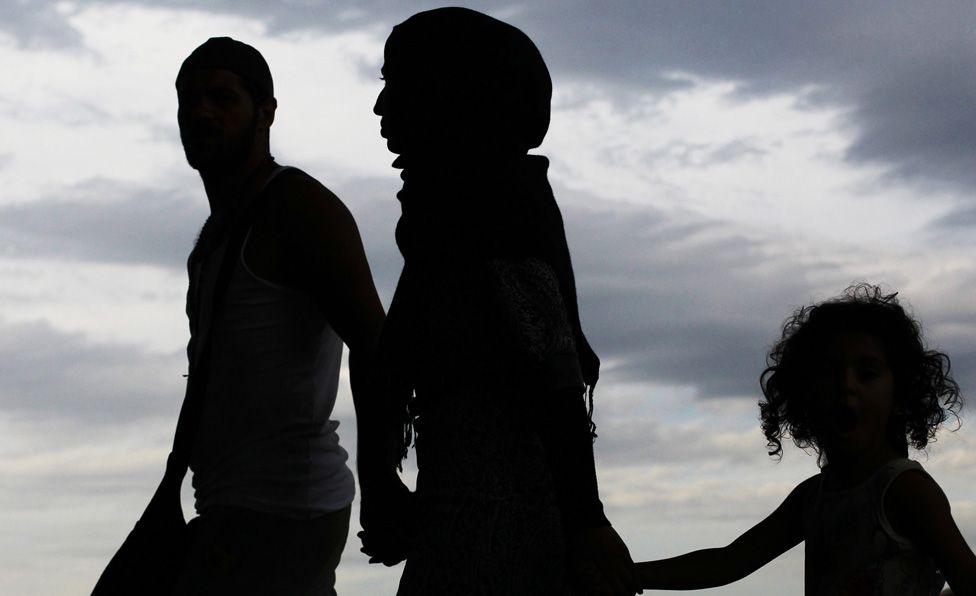Politeness and eloquence on the road to Europe
- Published

Reporting for weeks on the journeys of migrants as they trek north across south-eastern Europe, the BBC's Nick Thorpe now dreams of little else. He has talked to hundreds of people from dozens of countries - and to those who come out to greet them.
"We were sorry," said Hassan, a Palestinian refugee from Syria in his mid-30s, "to hear that Margaret Thatcher had passed away."
It was 05:30 in the morning, on Croatia's border with Hungary. We were standing in the middle of a country road in a fast-moving crowd of refugees, channelled by Croatian policemen and ambulance workers towards a gap in Hungary's new border fence.
Delighted to discover I was from the BBC, Hassan had granted me an interview. His parting condolences for Britain's former prime minister were his mark of respect to me, an Englishman, who had bumped into him in his hour of need.
These are strange days in the doorways of the European Union.
A month or so ago on another of Hungary's many southern borders, this time with Serbia, I had the following conversation with one of the doorkeepers - a rather overweight policeman. "What do you think is going to happen next?" I asked. It was dawn, again, when we are all more naked in our suffering, and more likely to open up to one another. "Dunno," replied the man in uniform. "It's like Monty Python's Flying Circus, isn't it?"
Giggling nervously at this chance encounter - a representative of the repressive organs with a sense of humour - I asked him which programme. "The Ministry of Silly Walks" he replied, without hesitation. I suddenly saw the thousands of policemen and soldiers along Hungary's new border fence in a new light - comedians entertaining tens of thousands of open-mouthed migrants with their peculiar antics, a shadow play performed in the fire-engine floodlights, with occasional spurts of tear gas. In case we don't weep with laughter.
One of the most exhausting aspects of this refugee drama for reporters is that we make ourselves available as story tunnels. We funnel the plight of individual men, women and children into Europe, and we funnel back the fears and concerns of Europeans to their countries of origin - and to the sprawling refugee camps surrounding them.
And we repeat and interpret the words of the politicians who want them in, or want them out, or can't decide.
For two months I haven't had a non-migrant dream. In the short watches of the night between the last evening raft of reports, and the early morning ones, I challenge statesmen, quarrel with friends, and explain to migrants where they might be fingerprinted, and what that might mean.
And in my waking hours I gather the tales of the host communities, too - both friendly, and hostile. Pista, 73, who stood at his garden gate offering his excellent home-made plum brandy to bemused Muslims, out of the kindness of his heart.
Alone in his village, Illocska in Hungary, he argued that everyone should be allowed in, for as long as they need safety from the bullets. But when it is safe to go home, they should.
A Catholic bishop forbade me from filming the frescoes in one of his churches, which portrayed a victory of Christian armies against the Ottoman Turks in the 15th Century. "It's too sensitive," his assistant told me. "The Bishops' Council is deeply divided over the refugee issue."
A young German idealist stood greeting each new arrival in turn at Roszke, beside the famous railway track from Serbia, with the words: "Salaam Alaikum, would you like a sandwich?" He left no space for the refrain: "Alaikum salaam."
An Indian friend told me the refugees are referred to, in Hindi slang, as kabutar - or pigeons. The word in this context means something like "opportunists" or "scavengers". If I was fleeing war, Rohini told me, "I would stay with people of my own culture, as near as I could to my own country." And I thought of the young Syrian tattoo artist who told me he had worked for a year in Istanbul, but was unhappy with the wages - $1,000 a month, so had joined the exodus to Germany. What birds will he tattoo on those bulging Teutonic biceps, those gentle Germanic thighs? And who has the right to say to him: "Go home to your own ruins"?
"What are you asking for, from the people of Europe?" I asked a man from Gao, in Mali, in the Hungarian dust before the weather turned to autumn? "Seulement ta pitie," he replied. "Just your pity."
At first light, a Syrian man in a suit stained dark with sweat, still wearing his tie, swung down the railway track towards me on his crutches. And who are you? I asked wearily, like so many Europeans. "I am, Sir, a sovereign man," he replied. Among so many sovereign nations, it was a relief to meet a sovereign man.
More from the Magazine
In early 2013 the Italian coastguard rescued 113 Africans from a boat in the Mediterranean. Among them was an illiterate 16-year-old boy from rural Gambia. Yahya had no family, no money, no European language. But when he got to Sicily, writes Daniel Silas Adamson, his luck turned.
Subscribe to the BBC News Magazine's email newsletter to get articles sent to your inbox.